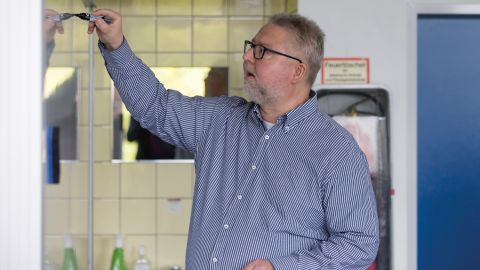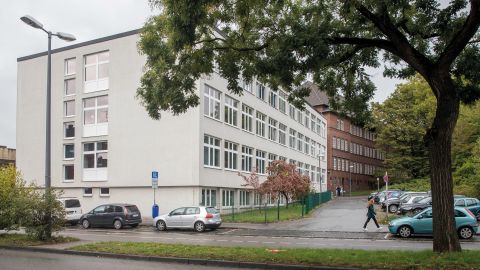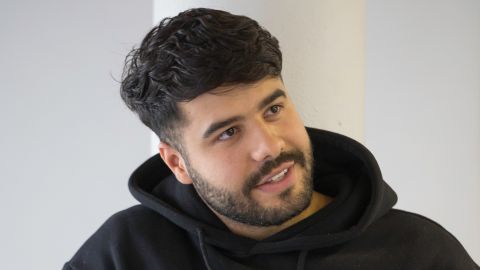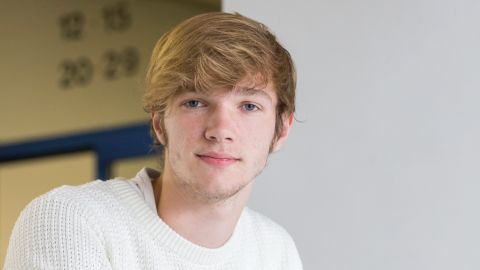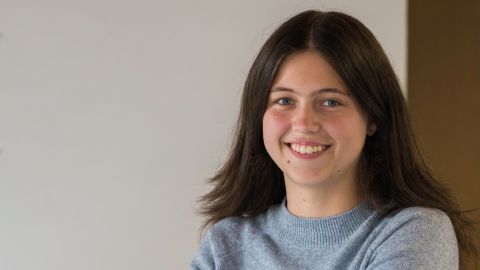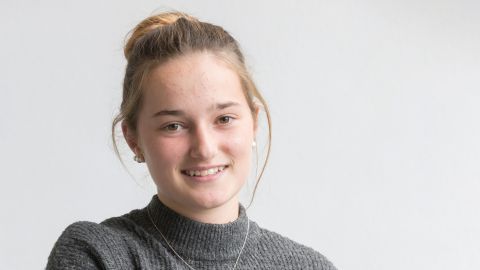"I used to dream about the shots fired at the Iranian-Turkish border all the time," recalls Ramin Majidi (21). Fortunately, the shots were only fired into the air and the nightmares disappeared over time. A more beautiful dream accompanied his childhood: "I always wanted to be a policeman." His family fled from the Taliban in Afghanistan to Iran when Ramin was still a baby. But even in Iran, the family was oppressed as refugees. At the age of 13, he fled to Germany with two cousins. For a safe life in a democratic country. For his dream job as a police officer.
Tuesday morning at the Königsstraße vocational college in Gelsenkirchen. "Law" is on the timetable with class teacher Jochen Janssen. "Today we're talking about values and standards in the police force," Janssen opens the lesson and draws a farm with an apple tree on the whiteboard. "Max takes an apple from farmer Schulte's tree," he describes the situation. "What crime could be involved here?" asks Janssen, who is not only a fully qualified lawyer but also a qualified theologian. "It's just an apple, is that even a criminal offense?" asks a student. "Sure, it's still the farmer's property. Imagine if everyone did that. That's how he earns his money," counters another pupil.
What values and norms play a role in society? What duties and rights do the police have? The class is given the task of looking at different police operations. Lea (16), Julian (17), Adriana (16) and Ramin (21) first choose the "traffic accident" assignment. "The police have to secure the scene of the accident, so they're doing emergency response," suggests Lea. "If they record the accident, they make sure that the person who caused it is punished," adds Julian. "And the damage to the car also has to be paid for," adds Adriana. "What standard has been breached here?" asks Janssen. "Someone hasn't complied with the Highway Code," a pupil interjects. "If someone is injured as a result of the accident, that's also a criminal offense," adds a pupil. "In law, we show the pupils specific everyday situations involving police law," explains Janssen. "The examples come from the areas of emergency response, law enforcement and traffic monitoring and safety. I really enjoy the commitment with which the students analyze the cases and try their hand at solving them by applying the legal regulations."
We teachers will also gain a lot of knowledge over the next few months.
Jochen Janssen
The new "Fachoberschule Polizei" course, a pilot police training program for students with an intermediate level of education, has been in place since summer 2022. 31 students between the ages of 15 and 22 have made it to the FOS Polizei in Gelsenkirchen. Lea, Julian, Adriana and Ramin are four of them. Now they are among the students from the social and healthcare sectors as well as business and administration. Real estate agents, bakers, cooks and hairdressers, for example, are also being trained at the Gelsenkirchen college.
At 21, Ramin is one of the oldest in the class - but not because he has "dropped out" several times. "I fled to Germany when I was 13 because my Afghan family had few rights in Iran. I was on the road for almost two months, even with people smugglers," he explains. In 2015, he and 15 other unaccompanied minor refugees came into the care of the SOS Children's Village, where they lived in a small gym for more than nine months before being placed in a residential group. He attended integration courses, a lower secondary school and a grammar school, but missed out on his secondary school leaving certificate at his first attempt due to a lack of language skills. "We met so many people who supported us. A teacher at the grammar school gave us the task of watching the news every evening and reporting on it the next day at school. That's how our German got better and better," recalls Ramin, who now speaks German without an accent. He trained as a social assistant and completed internships in elderly care and in institutions with children and people with special needs. This enabled Ramin to complete his secondary school leaving certificate with a qualification - with a grade of 1.6. Ramin found out about the FOS Polizei through Instagram. "I really couldn't believe that this opportunity existed," he says happily. After being accepted by the FOS, Ramin moved from Düsseldorf to Gelsenkirchen and lives alone in a council apartment - a stone's throw away from the FOS. "I have contact with my family in Iran, but I haven't seen my parents since I fled," says Ramin sadly. "But I'm going to visit them in the fall vacations - a reunion after seven years!"
Adriana and Ramin are two of a total of 16 FOS students who are assigned to the Gelsenkirchen authority, where they complete both the FOS and the internships. "They're all still here," says First Chief Superintendent Werner Wiebringhaus. He is Head of Recruitment at Gelsenkirchen Police and is part of the team of trainers. "That's not a matter of course," he explains. "Some of them have really long journeys and I wasn't sure if they would all pull it off." Adriana comes from Ammeln near Ahaus, around 80 kilometers from Gelsenkirchen. She lives here with her family on a farm with two horses and a dog. Her grandparents live next to the farm and keep cattle and chickens. "I actually wanted to go to the FOS in Münster, that would have been closer," she says. It now takes her just under two hours each way to get to Gelsenkirchen. "I pass the time with my twin sister Letitia - she's in the same class as me. We use the time on the train to study or just chill out," she says. The idea of applying to the police came to her at the riding stables. "I spend a lot of time there because I do vaulting and also train children's groups. There's a policewoman from the equestrian squadron there who told me a lot about the police. It would be great if I could ride side by side with her on duty one day." In her free time, Adriana enjoys singing with her sister and even performed at her graduation ceremony at Anne-Frank-Realschule in Ahaus.
What we really learned directly from the police: Shortcuts!
Julian
Julian lives with his parents and older sister in a house in Duisburg. Until the summer, he attended the Duisburg-Meiderich comprehensive school. "I always wanted to join the police, even as a very small child," he says, showing a childhood photo of himself in a green police costume and smiling mischievously at the camera. In August, the FOS students went on an excursion to the riot police in Wuppertal. "The police officers showed us lots of different emergency vehicles," explains Julian. "Water cannons and evacuation vehicles, for example. Climbers and divers were also there and gave demonstrations. I already wanted to join the police, but even more so now," enthuses the 17-year-old, who does a lot of sport in his free time. He plays table tennis successfully in the "Jungen-19-NRW-Liga" and is also involved as a coach in his club SpVgg Meiderich 06/95 for children and young people between the ages of 7 and 18.
Lea and Julian are two of five FOS students who are assigned to the Oberhausen authority but attend the college in Gelsenkirchen. "We have two days of vocational college and three days of practical training per week," explains Lea. Lea lives with her family in Oberhausen and has an older brother. "I've already been accepted for a three-week student internship with the police. That would have been in year 9 at Theodor-Heuss-Realschule, but then had to be canceled because of coronavirus," she recalls. She then came across the opportunity to apply for the FOS Polizei via the website www.genau-mein-fall.de. "That's when I knew: I really want to do this." Her parents were surprised at first, but were very supportive. She can imagine working for the criminal investigation department later on. "I'm totally open, as I find all areas of the police exciting. We've already been to various command posts, the command staff and the training center. We have already learned some intervention techniques here. Later on in the internship, we'll be going to the crime prevention/victim protection unit, among other things."
In her free time, Lea helps with riding therapy sessions for children with disabilities and jogs with her Havanese dog Gismo. She is currently taking driving lessons for her car driving license and would also like to drive a small scooter. "I've saved up for the second-hand scooter. It's already waiting for me in the garage," she says, looking forward to her first rides.
My colleagues were very nice and open with us.
Lea
"Lea and I amazed our colleagues during our internship at the traffic management office," says Julian. "We told them exactly how to record a traffic accident. From pressing the status transmitter when you arrive at the scene, to securing the accident site and exchanging personal details. We learned a lot of this in conversations we had during our excursion to the riot police."
Almost 2,500 pupils applied for one of the 341 places at eleven locations across NRW. Four more locations will be added for the start of school in August 2023, which will also open up more rural areas. As a result, there will be even more places in total next year, namely 465. "The demand for FOS Polizei is increasing at our vocational college. We are receiving more and more calls and students who are already here are also approaching us," says Deputy Headmaster Jörg Plackmann. "The dream of an FOS Polizei in Gelsenkirchen almost came to nothing," says Plackmann looking back. As it is a vocational grammar school, the requirements are different to those for the police academy. "Fortunately, we were able to recruit Jochen Janssen, a fully qualified lawyer, as a specialist teacher," says Plackmann happily.
"We can achieve the full entrance qualification for a university of applied sciences in two years and then have a provisional acceptance for the bachelor's degree course. But then we have to go to the police doctor for another health check," says Lea, describing the rest of the process. "The recruitment test was before the FOS. We took this PC test, went to the assessment center and to the police doctor. It's almost the same procedure as for school leavers," adds Adriana.
The first exam in law is coming up soon. "This is about the basics that the students have already understood," explains Janssen. They should also be able to analyze facts and assign them to areas of law. "Of course, much of this can also be found in the HSPV curriculum, but in the FOS it is broken down to the level of 15-year-old students without a technical college entrance qualification," Janssen continues. "The students can get a taste of what it's like to be a police officer. The actual training is still to come and is expressly not intended to be anticipated."
And what actually happened to thief Max? Was he arrested or released after his identity was established? "The weighing up of interests, discretion and proportionality will be continued in a later lesson," Janssen announces with a wink.
And what will happen to Ramin's childhood dream? "In the summer of 2024, I'll be finished with the FOS, then I'll be a trainee police officer, have my advanced technical college certificate and want to study at the police academy," says Ramin, who has a residence permit until 2024. "I really want to become a police officer in North Rhine-Westphalia. To stand on my own two feet and look after myself. I will do my best every day to achieve this."
